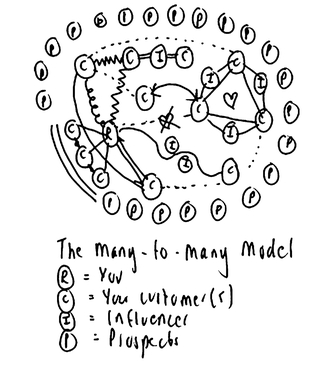GUILTY UNTIL PROVEN INNOCENT
We’re jaded. We’re skeptical. We’re damaged goods. We’ve become wary of corporations’ intentions when it comes to trusting companies today. And leading the charge or rationale behind this accusation is advertising itself. A 2009 Harris poll stated that 66 percent of consumers felt that advertising agencies bore at least some responsibility for the recession, because they “caused people to buy things they couldn’t afford.” Is it therefore any wonder that our defenses are up when we interact with a company? It took a while for me to get used to Audi’s periodic check-in calls, which—after almost eight years of sticking with the brand—still arouse some suspicion on my part.
Source: © Joseph Jaffe.
We need to change this perception with our customers. Perhaps the adage to draw on is “if at first you don’t succeed, try, try, try, try again.” And then again.
As depicted in
Figure 6.7, we live in what I call the many-to-many era,
17 characterized by a seemingly endless series of conversations between a multitude of constituencies (R=Brand; C=Customers; I=Influencers; P=Prospects). In a perfect environment, companies talk early, often, and honestly to their employees; customers talk to the company and its employees (and vice versa); and finally, customers talk to one another. These dialogues may occasionally skew negative ...


